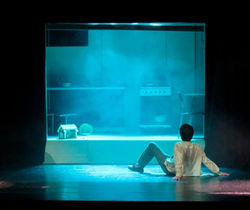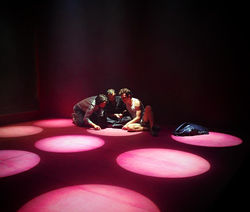Sebastián
Jaña
Prisoners Garden (2012)

The women of the prisoners receive dark letters that reveal unknown details of their men’s crimes. After that, they decide not to visit them again. The alleged author of the letters takes refuge in his cell, next to two other prisoners who protect him. Outside this cell, all the other prisoners are asking for the writer’s head. In addition to that, the most vocious prisoner is always around the cell, threatening him to starve him to death. Nevertheless, inside the writer’s cell is another prisoner, probably even more dangerous. He moves in other time, has lots of questions and a particular way to do riots.
Prisoners’ Garden expects to confront the audience with their own idea of a prison, seen as device of punishment and reform. Even more, the play pretends to question the violent, but socially accepted, relationships that Chileans have with those they consider as marginals. Exploring the tragic fate in a contemporary way, in which the characters’ destinies are not manipulated by deities, but imposed by underlying social structures. Prisoners’ Garden is a metaphor of the static and determinist Chilean social system, and Chilean’s relationship with violence, marginality and power.
Director: Sebastián Jaña
Playwright: Luis Barrales
Cast: Juan Pablo Miranda - Moisés Ángulo - Nicolás Zárate
Director Assistant: María Catalina Villanueva
Assistant: Benjamín Villalobos
Space Design: Marcos Guzmán
Music: Anselmo Ugarte
Costume Design: Daniela Vargas
Lighting Design: Pablo De La Fuente
Scenography Construction: Pablo De la Fuente
Photography: María Paz González - Eduardo Cerón
Video: Cristopher Murray
Graphic Design: Javier Pañella
Production and Press: Francisca Babul
The work was released in 2013 in the Matucana 100 Cultural Center, in Santiago de Chile.
 |  |
|---|---|
 |  |
 |  |
 |  |
 |  |
 |  |
 |  |
 |  |